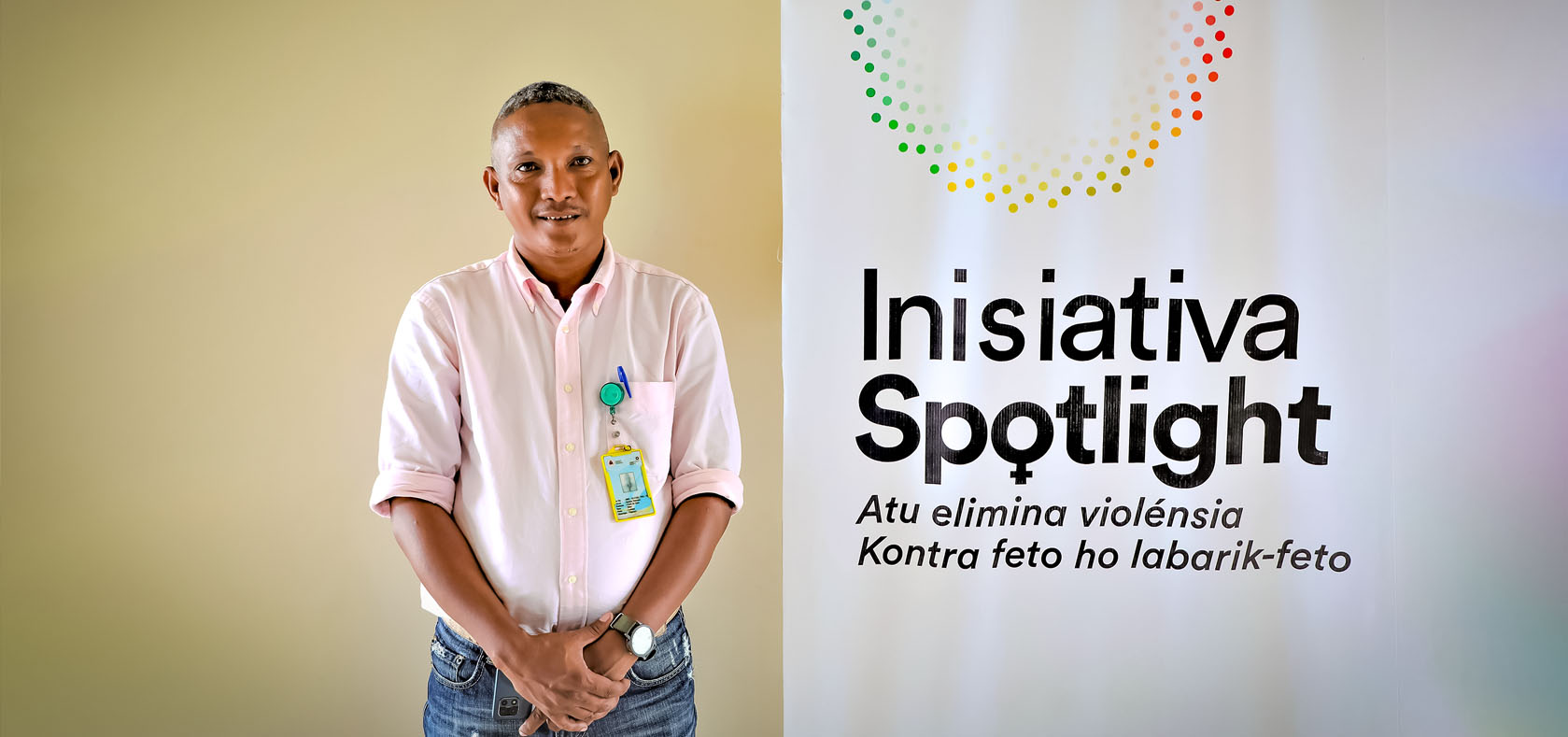Mai Koñese Jacinto Ximenes - Kampiaun Hapara Violénsia Kontra Feto no Labarik-feto ho Defisiénsia
Date: Wednesday, 20 July 2022
Author: Sylvio Fonseca

Iha Timor-Leste, ema barak hanoin katak Governu de’it mak responsavel ba inkluzaun no empoderamentu ba ema ho defisiénsia (EhD) iha sosiedade. Maibe sosiedade tomak iha knaar importante atu halo hodi hakbiit no apoia EhD sira. Hafoin Jacinto Ximenes eleitu nu’udar Xefe Suku iha Dilor, munisípiu Viqueque, nia fó rekoñesementu kona-ba importánsia husi nia knaar nu’udar líder no membru sosiedade atu servisu ba hapara violénsia kontra feto no labarik feto (HVKFL).
“Ha’u foin haree violénsia aumenta no falta oportunidade ba feto no labarik-feto sira ho defisiénsia iha ha’u-nia komunidade. Ha’u fiar tebes katak labele iha ema ida atu hetan tratamentu ladi’ak tanba deit sira-nia kondisaun fíziku ou mentál. Kondisaun sira ne’e fo motivasaun ba hau atu kandidata-an ba pozisaun Xefe Suku. Oportunidade no kontribuisaun hanesan ba ema hotu-hotu, sei halais dezenvolvimentu iha ita-nia komunidade tanba relasaun entre abilidade diferente no koñesimentu buat ida forte tebes,” hateten Jacinto ho fuan bot. Husik hela nia servisu nu’udar funsionáriu públiku, Jacinto hakarak tebes atu lori mudansa ba iha nia komunidade.
Jacinto benefísiu husi Inisiativa Spotlight UE-ONU nian liuhusi kolaborasaun ho Rede Rehabilitasaun Baze iha Komunidade Timor-Leste (Community Based Rehabilitation Network Timor-Leste/CBRN-TL), ho sira-nia sub-parseiru Naroman ba Futuru iha Viqueque, liuhusi kapasitasaun ba Igualdade Jéneru no prevensaun Violénsia Bazeia-ba-Jéneru (VBJ), espesifikamente kona-ba hato’o keisa no refere kazu VBJ.
Inisiativa ida-ne’e nia tarjétu mak komunidade no autoridade lokál sira iha munisípiu tolu (Bobonaro, Viqueque no Ermera) ho objetivu atu apoia grupu vulnerável, inklui feto no labarik-feto sira ho defisiénsia. Spotlight foku ba asegura asesu ba servisu esensiál sira iha kontestu VBJ liuhusi utiliza rekursu koñesimentu sira hanesan materia (toolkit) ba Prevensaun VBJ ba feto sira ho defisiénsia, liuhusi hasa’e konxiénsia kona-ba VBJ no HVKFL no kria asesu ba servisu sira atu rezolve problema siraki ne’e.</p> <p>Formasaun sira ne’e foku atu fahe informasaun kona-ba direitu EhD nian – no hare liu ba inklui no apoia sira-nia partisipasaun ativu iha sosiedade. Nia objetivu mak atu hatudu ba komunidade oinsá sosiedade bele hamutuk, identifika risku no prevene violénsia hasoru feto no labarik-feto sira ho defisiénsia.
Feto no labarik-feto ho defisiénsia esperiénsia forma violénsia hanesan ho violénsia ne’ebé feto no labarik-feto hotu-hotu hasoru (abuzu psikolójiku, fíziku, seksuál no ekonómiku). Ho sira-nia esperiénsia moris lahanesan, feto no labarik-feto sira ho defisiénsia hasoru risku aas liu ba violénsia kompara ho feto no labarik-feto sira la hó defisiénsia.
“Ha’u rasik haree oinsa urjénsia ba asuntu violénsia kontra feto no labarik-feto ho defisiénsia. Ha’u haree sira barak hetan abuzu fíziku, abandona husi sira-nia parseiru bainhira isin-rua hela no ikus liu deside atu habadak sira-nia moris.” Hatutan Jacinto, “Norma ne’ebé sosiedade hatúr katak mane tenke di’ak liu ou hetan fatin aas liu feto, ida-ne’e enkoraja mane sira atu diskrimina no viola feto no labarik-feto sira no aat liu tan ba feto no labarik-feto sira ho defisiénsia.”
Antes partisipa iha Inisiativa Spotlight nia programa, Jacinto hola parte ona iha inisiativa sira-seluk ne’ebé foku ba hamenus violénsia kontra feto no labarik-feto sira ho defisiénsia. Nia sempre ativu hodi ajuda feto no labarik-feto sira ho defisiénsia atu hatán ba problema ne’ebé sira hasoru iha komunidade. Porezemplu, kontaktu ONG relevante ne’ebé bele fó ekipamentu EhD nian (kadeira-roda, ai-tonka mutin, no ain-prostétiku) no refere sira ba uma-mahon seguru atu ajuda movimentu EhD sira-nian. Nia mós hato’o katak iha uma-mahon ida, sira fó ajuda ba EhD na’in 3 hodi hetan asesu ba edukasaun superiór no agora sira estuda hela iha Universidade Nasionál Timor-Leste (UNTL).
Tuir Jacinto, partisipasaun iha Inisiativa Spotlight hanesan esperiénsia ne’ebé muda nia moris, inisiativa ne’e fó apoiu espesífiku ba nia vizaun atu sai Xefe Suku, atu fó biban ba EhD sira no reforsa esforsu sira ba prevensaun. “Maske hau ativu ona hodi apoia feto no labarik-feto sira ho defisiénsia, sesaun kapasitasaun fornese liuhusi Inisiativa Spotlight hasa’e tebes ha’u-nia koñesementu kona-ba asuntu ne’e, liuliu fó perspektiva foun atu hakbesik ba no sensibiliza komunidade ba EhD sira, liuliu feto no labarik-feto sira-ne’ebé hasoru risku aas liu husi violénsia. Esperiénsia ne’e nu’udar pasu ida iha dalan ne’ebé ha’u foin hahú.”
Nu’udar Xefe Suku, Jacinto hatene katak nia mak besik liu ona komunidade sira no nia haree katak impaktu boot sira bele mosu iha-ne’ebá. “Agora ha’u foin bele dehan katak dalan ne’ebé ha’u hakbesik ba ha’u-nia komunidade, ema hatene tan ona oinsá sira tenke halo interasaun ho EhD sira no neineik-neineik sira sei hatene no sai sensivel liu ba kria oportunidade hanesan ba EhD sira."